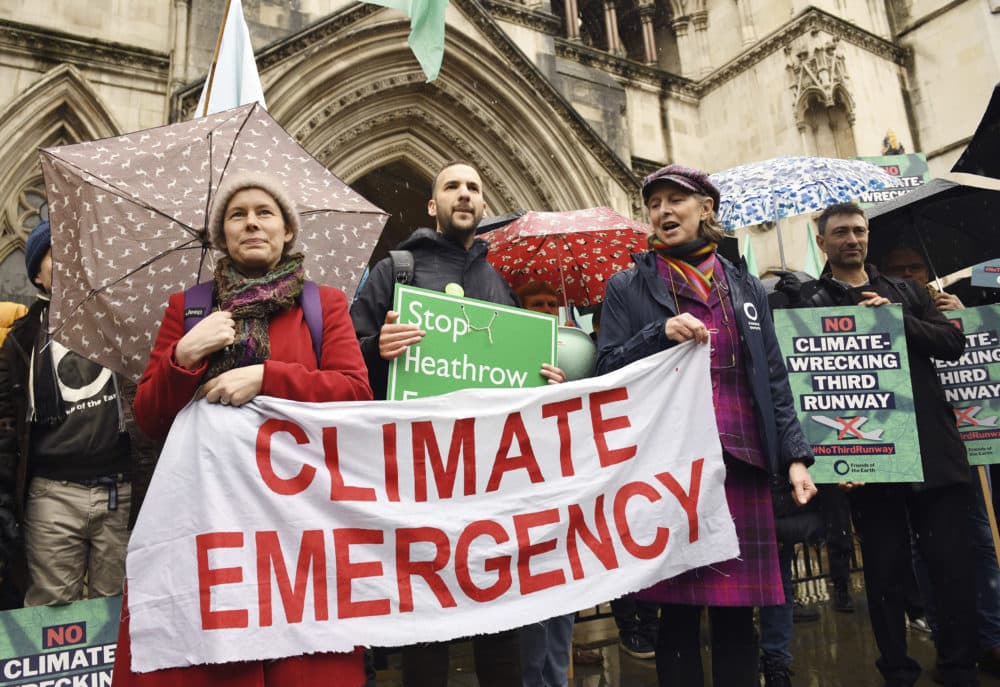Advertisement
Commentary
Today Is Earth Day. This Is Your Reminder That After Coronavirus, Another Grave Threat Looms

This chaotic year marks the 50th anniversary of the first Earth Day in April 1970. That year, too, was tumultuous, in ways very different from this one.
In the thick of the Cold War, the specter of a nuclear apocalypse haunted the world. Richard Nixon presided over a nation torn by racial tension and the ongoing war in Vietnam. Detroit's ungainly gas guzzlers cruised the highways, swilling leaded fuel and filling the skies with gray-brown smog. The country's urban rivers were industrial sewers.
The protests and teach-ins of the original Earth Day emerged from this ferment, led by student activists and a visionary senator from Wisconsin.
Fifty years later, thanks to the passage of major federal laws regulating pollution, the air is clearer and the water cleaner. But there is 25 percent more climate-warming carbon dioxide in the atmosphere, and there are more than twice as many people on Earth. Our crowded planet is seething in a steadily rising Anthropocene fever.
Governments will set directions during the recovery period that will weigh heavily on the answers to crucial environmental questions.
On this Earth Day, the world is battling a pandemic that has mercilessly inflicted death and torment on millions of people. The grip of the coronavirus shattered a global economy whose supply chains proved too tightly stretched by unforgiving markets. The hemorrhaging of jobs is unparalleled in the nation's history.
Economists caution against expecting a speedy return to normal. As the threat of infection subsides, the nations of the world will be tasked with reckoning the damage, understanding its causes, and arriving at reforms that will impart social and economic resilience. Governments will set directions during the recovery period that will weigh heavily on the answers to crucial environmental questions.
Consider, as an example, the innovative post-pandemic initiative that Amsterdam announced earlier this month. The plan hinges on the insight that environmental forethought can both inform and reinforce policies for meeting the basic human needs of all citizens.
Amsterdam's approach is based on the macroeconomic work of Kate Raworth, a British economist known for what she metaphorically terms "doughnut economics." The hole in her doughnut is the core social foundation of human needs — food security, shelter, education, healthcare, clean water, energy, etc. — and the outer edge of the doughnut corresponds to a set of planetary boundaries that human activities should not transgress. Those boundaries include, among others, limits on atmospheric carbon, minimums for habitat conservation, a baseline level of biodiversity, and limits on environmental toxins.
Raworth's objective is to have societies operating within the "doughnut," that is, they should integrate efforts to close the gaps in the social infrastructure with efforts to minimize environmental harm. Policymakers can assess potential actions against the criteria that are inherent in the framework. For example, a program to collect and redistribute surplus edible food from restaurants works because it provides meals for the disadvantaged while reducing emissions of greenhouse gases from landfills.
Raworth's model is more than a marriage between sustainable economic development and a strong social safety net. Instead of emphasizing growth and market performance, doughnut economics advocates a service-oriented circular economy in which waste and the consumption of materials are minimized. Growth is secondary. This approach is fundamentally different from the prevailing neoliberal model that aims to maximize consumption, based on the premise that growth creates the wealth necessary to support a just society.
In the five decades since the first Earth Day, growth-driven corporate capitalism produced historic levels of wealth and income inequality, and it stubbornly resisted the development of technologies that would jeopardize the dominance of fossil fuels in our energy systems. Now, as we recover from the pandemic while still confronting a climate emergency, do we dare ponder what situation we'll find ourselves in on the 60th anniversary of Earth Day?
By 2030, will the world have set a clear course toward a greener and more equitable future, or will it be irreversibly bound toward a protracted climate crisis of a scale that dwarfs the current situation? In the wake of the pandemic, a global shift toward a doughnut-style economic model would better prepare society to respond to public health crises and help to avoid future outbreaks of viral disease. It would also advance a just transition to a decarbonized economy that mitigates climate risk.
... do we dare ponder what situation we'll find ourselves in on the 60th anniversary of Earth Day?
The idea of retooling the economy for social equity and environmental awareness may sound radical, and there are numerous obstacles to its realization. But it isn't new.
Gaylord Nelson, the senator from Wisconsin who pioneered the first Earth Day, understood the need to fuse the dual goals of social justice and ecological consciousness, offering these words in Denver on April 22, 1970: "Our goal is not just an environment of clean air and water and scenic beauty. The objective is an environment of decency, quality and mutual respect for all other human beings and all other living creatures."
On this uniquely solemn Earth Day, let us imagine Nelson’s vision unfolding in our future.
